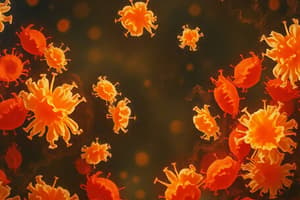Podcast
Questions and Answers
What is the primary function of helper T cells in the immune response?
What is the primary function of helper T cells in the immune response?
- To break down foreign proteins into fragments
- To engulf and destroy foreign pathogens
- To directly kill infected cells
- To recognize and bind to foreign antigens on MHC proteins (correct)
Which type of immunity involves the rapid recognition and destruction of foreign antigens?
Which type of immunity involves the rapid recognition and destruction of foreign antigens?
- Adaptive immunity
- Specific immunity
- Cell-mediated immunity
- Innate immunity (correct)
What characterizes the adaptive immune system?
What characterizes the adaptive immune system?
- It can only produce antibodies but not cell-mediated responses.
- It provides immediate defense against all pathogens regardless of type.
- It includes T lymphocytes and B lymphocytes that respond to specific antigens. (correct)
- It relies solely on physical barriers like skin.
How do B lymphocytes respond when they encounter a foreign antigen?
How do B lymphocytes respond when they encounter a foreign antigen?
What might be the consequence of having an abnormally low number of helper T cells?
What might be the consequence of having an abnormally low number of helper T cells?
What role do MHC proteins play in the immune response?
What role do MHC proteins play in the immune response?
What type of cells are primarily responsible for inducing apoptosis in infected cells?
What type of cells are primarily responsible for inducing apoptosis in infected cells?
Which of the following statements about antigen presentation is true?
Which of the following statements about antigen presentation is true?
Flashcards
Innate Immunity
Innate Immunity
The immune response that is rapid and nonspecific, targeting foreign antigens immediately.
Adaptive Immunity
Adaptive Immunity
A specialized immune response that recognizes specific antigens and mounts tailored responses.
Cell-mediated Immunity
Cell-mediated Immunity
A type of adaptive immunity where T lymphocytes target and respond to foreign antigens.
Humoral Immunity
Humoral Immunity
Signup and view all the flashcards
MHC Proteins
MHC Proteins
Signup and view all the flashcards
Helper T Cells
Helper T Cells
Signup and view all the flashcards
B Lymphocytes
B Lymphocytes
Signup and view all the flashcards
Cytotoxic T Cells
Cytotoxic T Cells
Signup and view all the flashcards
Study Notes
Innate and Adaptive Immunity
- Innate immunity is rapid and non-specific, destroying foreign antigens.
- Adaptive immunity is specific, divided into cell-mediated and humoral immunity, targeting particular antigens.
Cell-Mediated Immunity
- T lymphocytes recognize antigens displayed by MHC proteins on other cells.
- MHC proteins display fragments of proteins inside a cell.
- Cells infected with pathogens display foreign antigens on MHC proteins.
- Helper T cells recognize antigens presented by MHC proteins.
- They release cytokines, triggering B lymphocyte division.
Helper T Cell Role
- Helper T cells bind antigens displayed by B lymphocytes.
- B lymphocytes engulf foreign antigens, breaking them down.
- Fragments are presented on MHC proteins.
- Helper T cells trigger B lymphocyte division and antibody production.
- They also bind antigens on macrophages and dendritic cells.
- This stimulates other immune responses, like macrophage phagocytosis and cytotoxic T cell activation.
Implications of Low Helper T Cell Count
- A low count of helper T cells affects cytotoxic T cell and B lymphocyte activation.
- B lymphocytes produce antibodies to target invading pathogens.
- MHC protein expression is independent of helper T cell count, allowing antigen presentation.
Studying That Suits You
Use AI to generate personalized quizzes and flashcards to suit your learning preferences.




